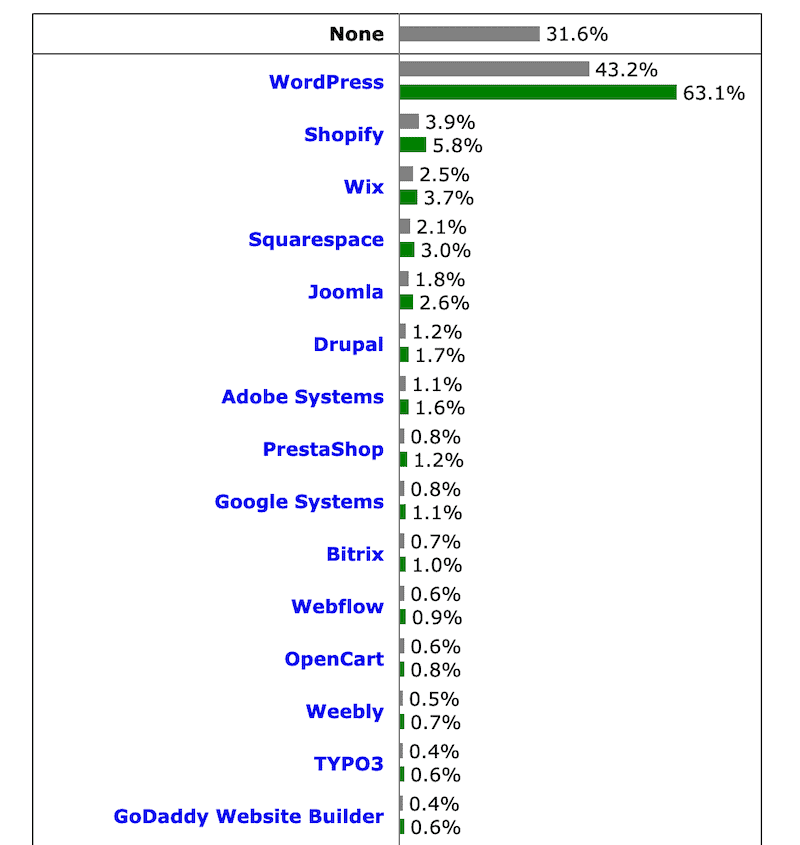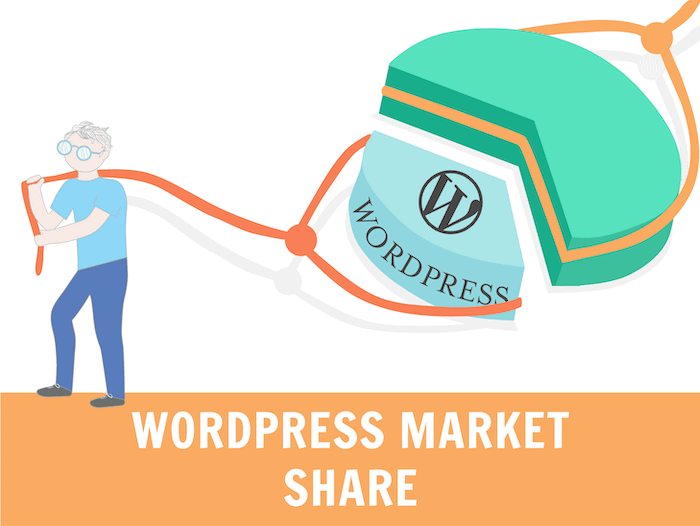WordPress has become THE dominant force on the CMS market in recent years. However, its market share has stagnated as it loses ground to more all-in-one solutions like Wix and Squarespace. That being said, its usage rate is still around 20 times that of either of these platforms, making it the world’s most popular CMS by a significant margin.
This article explains some facts and figures around WordPress in comparison to other content management systems.
How big is WordPress’ market share?
43.2% of the world’s websites are built with WordPress according to w3techs.com. If we look at websites that are created with CMSs, that number is even higher: 63.1% of websites built with an identifiable content management system, are currently using WordPress!
That’s right! Everyone from small bloggers to huge country-sized corporations use WordPress to manage their content.
Since its founding in 2003, WordPress has grown from a blogging tool to a full-blown CMS that powers large swaths of the Internet. So exactly how many and which sites are built with WordPress?
I’ve sifted through the data and here’s what I’ve found…
Nearly half of the Web is built on WordPress
The chart below shows which platform was used to build the top million most visited websites in the world. The grey bars include websites that don’t use a CMS. The green bars only include websites where we can identify a CMS.

So, while 31.6% of the world’s websites were created without an identifiable CMS, 43.2% of all the world’s websites were created with WordPress!
And of the world’s websites that were created with an identifiable CMS, WordPress accounted for a whopping 63.1% of them. Their nearest competitor Shopify is still a distant second, powering only 5.8% of the sites sampled.
What’s the difference between WordPress.org and WordPress.com?
It’s easy to confuse the open-source platform of WordPress.org with the hosting service of WordPress.com.
WordPress.com is just one of many web hosting services that offer support for the WordPress platform. It’s owned by the company Automattic Inc. which also contributes to the WordPress open-source project. WordPress.com offers a somewhat simplified website builder to help create websites more easily. Check out our WordPress.com review for more details.
WordPress.org is the actual platform for creating websites. It’s very customizable as you can access all of its code. You are also able to use any plugin in the WordPress repository and are free to choose any web hosting company you can afford. But all that comes with a steeper learning curve. Check out our guide to creating a website with WordPress.org for more information.
And if you’re unsure which option is best for your website, our WordPress.com vs WordPress.org article will help you decide.
Big companies and bloggers alike use WordPress.com
There are many WordPress.com pricing options ranging from a freemium plan with limited features (compared to other free website builders), to small business e-commerce plans to their WordPress VIP service which is a hosting service at an enterprise scale.
CNN, Spotify, People, TIME, Microsoft, and The Rolling Stones are some of their most notable clients. In 2010 Microsoft shut down their Windows Live Spaces blogging service and began a partnership with WordPress.com
WordPress.org is still dominant but its growth seems to be slowing
In the past five years, the share of WordPress users has grown from being used by 32.7% of the top 10 million most visited websites in the world, to being used by 43.2%, outpacing the growth of all of its competitors.
The flexibility of large companies to either self-host a modified WordPress site, or use the enterprise services of WordPress.com make it far and away the largest CMS on the Internet and it continues to keep growing.
For aspiring bloggers, the fact that it’s free means that all they need is a cheap WordPress hosting provider, and they’re good to go! And there is a vast online knowledge base that makes climbing the steeper learning curve a little bit easier.
The chart below shows how the WordPress market share has grown over time compared to the other platforms. However, in 2022 for the first time, WordPress’s market share has declined. Has it reached its peak?
| CMS Platform | 2014 | 2015 | 2016 | 2017 | 2018 | 2019 | 2020 | 2021 | 2022 | 2023 (Aug 7) |
|---|---|---|---|---|---|---|---|---|---|---|
| None | 64.8% | 61.7% | 56.6% | 53.3% | 51.3% | 45.3% | 43.1% | 38.3% | 33.8% | 31.6% |
| WordPress | 21.0% | 23.3% | 25.6% | 27.3% | 29.2% | 32.7% | 35.4% | 39.5% | 43.2% | 43.2% |
| Shopify | 0.1% | 0.3% | 0.4% | 0.6% | 0.9% | 1.4% | 1.9% | 3.2% | 4.4% | 3.9% |
| Joomla | 3.3% | 3.3% | 3.3% | 3.4% | 3.2% | 3.0% | 2.6% | 2.2% | 1.7% | 1.8% |
| Drupal | 1.9% | 2.0% | 2.1% | 2.2% | 2.3% | 1.9% | 1.7% | 1.5% | 1.3% | 1.2% |
| Wix | 0.1% | 0.1% | 0.2% | 0.3% | 0.4% | 1.0% | 1.3% | 1.5% | 1.9% | 2.5% |
| Squarespace | 0.1% | 0.2% | 0.4% | 0.5% | 0.7% | 1.4% | 1.5% | 1.4% | 1.8% | 2.1% |
Peak year for every CMS bolded
This chart shows how open-source competitors Joomla and Drupal are losing market share relative to WordPress. While WordPress has a market share that is significantly higher than all of its competitors, it seems to have stopped growing. The ones that are still growing strongly are Wix and Squarespace, which run on proprietary platforms.
So, whose market share is bigger, Wix.com or WordPress?
Among all the available website builders, Wix’s market share is the largest of all the hosted website builders (such as Squarespace, GoDaddy and Weebly). According to builtwith.com, 0.55% of the top 1 million websites are built with Wix.com.
But that’s still a drop in the ocean compared to WordPress’s overall market share. WordPress is the platform for a whopping 29.33% of those sites. This includes both WordPress-built websites and WordPress.com-hosted websites. While it’s hard to tell exactly how many WordPress websites there are, several sources on the internet estimate that there are around 455 million WordPress-built websites in total.
You might be wondering – what’s the split between WordPress.org and WordPress.com sites? That’s a little tricky to answer. WordPress.com market share numbers are hard to come by, but their website does publish that “Over 409 million people view more than 20 billion pages each month” on WordPress.com, which isn’t really all that helpful.
Wix on the other hand claims to have 240 million users, although it’s not clear how many of these have live/active websites.
Looking at Ahrefs for a comparison, we can see that, surprisingly, people searched for Wix 3.8 million times per month on average, times versus WordPress which was searched for 2.3 million times. However, you have to take into account that Wix is a publicly traded company and a fair share of the interest in Wix could be from shareholders.
This can give us a glimpse into the interest in these two companies and perhaps a little insight into their comparative sizes.

Google search volumes for Wix

Google search volumes for WordPress
We’ve also done a qualitative comparison of Wix and WordPress, in case you are interested in that.
Will WordPress continue to be the dominant CMS on the internet?
The signs look good that WordPress will continue to grow. As a nimble, well-supported open-source product, they have been able to quickly address bugs and security issues over the years and that doesn’t look to change.
The introduction of WooCommerce, (which got acquired by Automattic in 2015 and is a popular ecommerce plugin) has helped WordPress stay competitive and relevant for online store owners. Very competitive, in fact, as WooCommerce’s market share is impressive too.
Additionally, its affiliated hosting service, WordPress.com is nipping at the heels of Wix.com which should make for an interesting competition in the years to come.
Will WordPress.com finally unseat Wix.com as the most popular web host? Time will tell, but it is a good bet that WordPress’s open-source architecture is here to stay!
Tell us what you think about WordPress’s Market Share!
We keep our content up to date
07 Aug 2023: Updated numbers
11 Jan 2023: Updated numbers
01 Jun 2022: Updated numbers
20 Apr 2022: New WordPress.com pricing plans introduced
12 Apr 2021: Updated numbers
17 Dec 2020: Updated market share numbers
THE BEHIND THE SCENES OF THIS BLOG
This article has been written and researched following a precise methodology.
Our methodology

